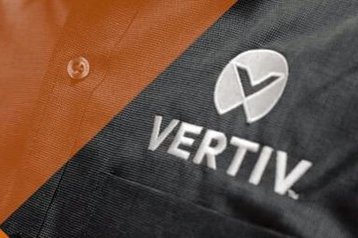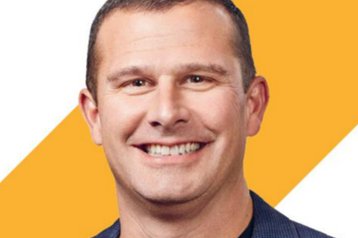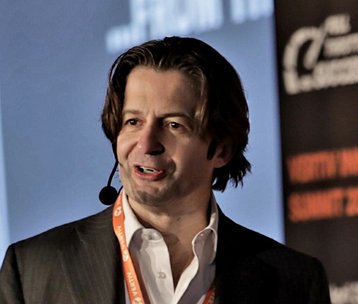Data center infrastructure vendor Vertiv has urged a New York court to dismiss a class action fraud lawsuit against the company, which claims it misled investors who lost out when the Vertiv share price crashed in February 2022.
The action, led by a number of pension funds, claims that Vertiv inflated its prospects massively during 2021, after it had floated on the New York Stock Exchange. Actual figures released in February 2022 were significantly worse than predicted, and Vertiv’s share price crashed by 37 percent, reducing the value of shareholders‘ investments.
The 76-page class action suit filed at New York's Southern District Court is led by Louisiana Sheriffs’ Pension & Relief Fund, Orlando Police Pension Fund, City of Plantation General Employees Retirement System, Riviera Beach Municipal Firefighters’ Pension Trust Fund, and City of Riviera Beach General Employees’ Retirement System.
The suit also names Robert Johnson, who quit suddenly as CEO in late 2022, citing health concerns. New CEO Giordano Albertazzi took over in early January 2023.
Vertiv and its owners Platinum Equity have argued that executives’ predictions before February 2022 were sincere, but could not be met because of unexpectedly high inflation and other factors. The company’s lawyers, Ropes & Gray, also point out that none of the executives, including Johnson, benefitted from an artificially high stock price by selling options.
The company also says a lot of what was said before February 2022 were “safe harbor” or “forward-looking” statements, and investors should have understood the risks attached to them.
The plaintiffs' lawyers, Bernstein Litowitz Berger & Grossmann, are expected to oppose Vertiv's motion to dismiss the case, and no date has been set for any court hearing.
In the meantime, we are left with one side's word against the other.
The claims of the lawsuit
Vertiv, formerly Emerson Network Power, was sold to Platinum Equity and co-investors for $4 billion in 2016 and was then taken public through a SPAC merger in 2020, co-sponsored by an affiliate of The Goldman Sachs Group and David M. Cote, a former CEO of Honeywell.
Robert Johnson was appointed Vertiv’s CEO in 2016 and remained at the helm during the IPO.
According to the lawsuit, Vertiv’s profit margins were lower than its rivals. The company’s lead executives, including Johnson, produced a growth plan which claimed that Vertiv could increase its margins by up to 500 basis points, by keeping costs fixed while putting up prices.
Demand went up during 2020, as data centers boomed during the Covid pandemic, but the industry faced travel restrictions and supply chain problems. Vertiv claimed it was still “getting price,” i.e. increasing margins, and passing costs on to customers to meet its profit goals.
The company claimed its sales staff were not discounting, and said it could even retroactively increase prices on a $2 billion backlog of equipment through surcharges allowed in contracts that had already been sold.
The February 2022 figures undermined these claims, and caused substantial losses to investors, according to a class action lawsuit launched by Bernstein Liebhard LLP in May 2022.
“Analysts and investors heavily relied on Defendants’ specific and repeated representations,” says the suit. “In turn, Vertiv’s stock price skyrocketed by over 37 percent, from $20.80 per share at the start of the Class Period to reach a Class Period high of $28.59 per share on September 2, 2021”
During the period of 2021, when the pandemic and other factors caused inflation and supply chain challenges, Vertiv assured investors that these inflationary “headwinds” were transitory, and the company would use them “strategically as a way to get additional price.”
The company raised its guidance (its promise of performance) twice in 2021, based on these assertions.
The suit says this could not last. In September 2021, Vertiv cut its guidance, with the management again promising that it would be able to increase margins in future.
Then in February, the picture became clearer: “At the end of the Class Period, Defendants admitted the full truth,” says the class action suit. “Specifically, on February 23, 2022, Vertiv shocked the market by reporting adjusted operating income for fiscal 2021… was 43 percent below the low-end of management’s fourth-quarter guidance range, and that it had missed its annual guidance for that metric by over $80 million.”
Far from increasing its prices, Vertiv had been forced to discount to get and keep business. Vertiv’s executive chairman David Cote admitted Vertiv was “underpricing its contracts,” and had gotten “behind on the inflation recovery curve with insufficient price and stayed there all year.”
In various publicly reported conversations, Johnson and his colleagues admitted that salespeople were incentivized on getting business, rather than price or margin, and offered discounts of up to 65 percent, at a time when Vertiv’s competitors increased prices by between five percent and 15 percent.
They didn’t pass on increased freight and materials cost - and, the suit says, would not have been able to do so accurately, because of problems with the company’s internal pricing system, known as CPQ (configure, price, quote).
As to the order backlog, Johnson admitted that it hadn’t been a source of increased revenue, saying the company “didn’t get a lot of pricing on the backlog,” and had to “burn through” it.
Vertiv’s shares fell 37 percent in a day, to a figure half the high point of a few months earlier. The company lost some $2.7 billion in value, and analysts lashed out at the management’s credibility.
Instead of increasing margins on its backlog, Vertiv was faced with potentially lower margins on it. The majority of the company’s business came from long-term enterprise contracts with cloud giants like Amazon, Facebook, and Google, which meant it had a $3 billion backlog by 2021, $2 billion of which was for US business.
Far from increasing margins, the suit alleges that those contracts discounted the Vertiv equipment, and expressly prevented Vertiv from increasing prices if its costs increased.
"Fraud-by-hindsight"?
However, all of this is "fraud by hindsight," says Vertiv's 44-page motion to have the case dismissed. According to Vertiv's lawyers, Vertiv management always warned that inflation might make it impossible to reach the numbers it promised. They believed what they said at the time, and investors should have been aware of the risk that they might be wrong.
Vertiv's motion accepts that the company had a history of "flat" pricing under Emerson's ownership, but asserts that this was changing - but not fast enough to offset a truly unprecedented inflationary event in its supply chain during 2021.
According to its motion, in February 2021, Vertiv estimated that inflation would create a $20 million impact, $15 million of which could be offset by pricing.
In fact, it was hit by $188 million in inflation: In response, it managed to increase $53 million in pricing, beyond its $15 million estimate, but far short of the inflation hit.
Vertiv's lawyers also point out that the named executives did not benefit directly from the "inflated" share value: "The Officer Defendants sold no shares and exercised no stock options when Vertiv’s stock was allegedly artificially inflated, which undermines an inference of fraud."
The class action suit points out that Vertiv's majority owner Platinum Equity benefited in November 2021, by selling one-third of its holding (20 million Vertiv shares) in a secondary public offering, making over $544 million. During this time Johnson's salary increased, amounting to nearly $20 million in compensation in 2020, up from $3.3 million in 2019. Two of Johnson's brothers and two sons working at the company are named, along with other executives including CFO David Fallon, and chief strategy and development officer Gary Niederpruem, who helped engineer the original purchase by Platinum Equity.
All the statements quoted by the class action suit should have been understood to be projections, with a certain risk attached to them, say Vertiv's lawyers, moving to have the case dismissed.
The motion points out that many of the statements took place in earnings calls and other platforms covered by safe harbor statements.
"The statements in question were identified as 'forward-looking' and were accompanied by language that expressly warned of the factors that Plaintiffs allege caused their loss." says Vertiv's motion, adding that Vertiv’s press releases and investor presentations contained the standard caveat that they may “contain forward-looking statements within the meaning of the [Private Securities Litigation Reform Act - PSLRA],” including “statements regarding the financial position... business strategy and plans and objectives of Company management for future operations,” and that these “statements constitute projections, forecasts, and forward-looking statements, and are not guarantees of performance.”
Non-actionable optimism
The motion also says that some of the Vertiv executives' statements were "generic expressions of optimism that are immaterial as a matter of law," quoting a previous ruling that “General statements of optimism and puffery are non-actionable under federal securities laws because they are not sufficiently specific that a reasonable investor could rely on them as a guarantee of some concrete fact or outcome.”
There is another lawsuit outstanding that may come to the fore. Vertiv is also facing claims that it artificially inflated the likely revenues of Irish engineering firm E&I, which it bought in 2021, paying nearly $2 billion for a company that critics say was worth only $1 billion. Vertiv has also inherited an unsettled suit that claims that E&I indulged in industrial espionage, stealing business from rival SAI.
Vertiv paid $1.8 billion for E&I in 2021, in a deal led by Vertiv’s European head Giordano Albertazzi, who has since replaced Johnson as Vertiv CEO.
In the E&I acquisition, Vertiv predicted that the new subsidiary would make $120 million of EBITDA profit over the year, but it in fact only made around half of that. E&I is also alleged to have stolen customers from its rival SAI, according to the unresolved industrial espionage lawsuit, which claims that a former SAI employee who moved to E&I, used SAI trade secrets to win business for E&I in 2021. The claims have not been independently verified.
In addition to filing the motion to dismiss the primary case, Vertiv declined to comment, responding to our query with the following statement: “We strongly disagree with the premise of the suit and have meritorious defenses, but will not comment further regarding ongoing litigation.”



